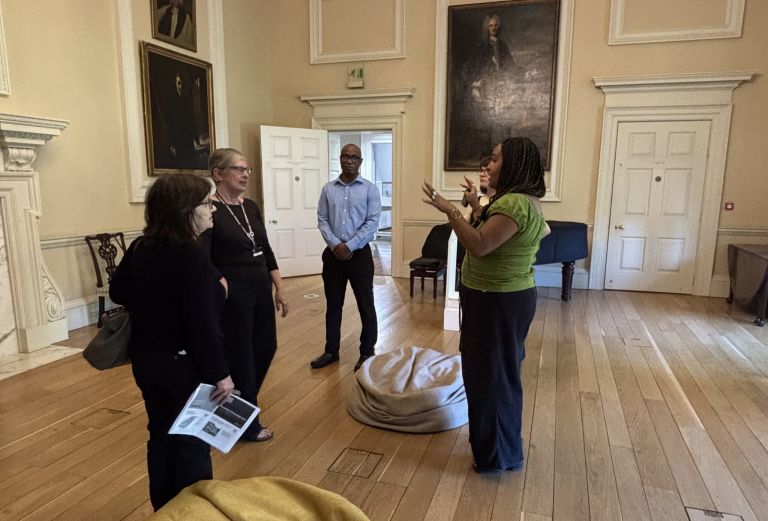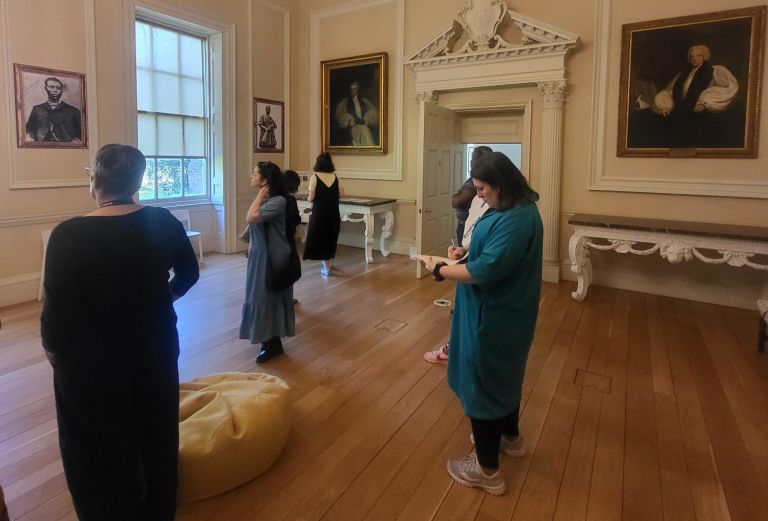
Written by Amy Barker, membership & fundraising manager at Fulham Palace.
Earlier in 2025, we were accepted to be a host museum for the Knowledge Sharing Programme, a new initiative created by the Transatlantic Slavery and Legacies in Museums Forum (TSLMF).
The Knowledge Sharing Programme was set up to offer museums and heritage staff the opportunity to learn through practice and some emerging theory, how to more successfully, ethically and sustainably work with the history and legacies of transatlantic slavery to embed decolonial practice into their organisation’s approach to this work.
What is the Transatlantic Slavery and Legacies in Museums Forum?
This forum is the first national network of its kind, focusing on sharing current discourse and creating a narrative thread to fully represent slavery and its legacies in the UK. Led by National Museums Liverpool and made possible by an Arts Council National Lottery Project Grant, this forum was established to create space for sharing best practice, offering support through regular workshops and events, and amplifying the work being done across the UK. The goal is to help museums to fulfil their moral obligation to correct overlooked narratives, expand their practice, and help society heal and grow together.
Fulham Palace as a host museum
As a host museum for the forum, we hosted a group of seven participants from museums across the country, focusing on sharing our work and setting a practical challenge for the participants to collaboratively find a solution for. The participants came to the host day with a solid understanding and experience of decolonisation in the arts and heritage sectors, and within the group a range of roles within the sector were represented, including curatorial roles, learning, and visitor experience.
Prior to the host day, participants had training led by Global Majority practitioners, which explored decolonisation in practice, focusing on process, planning, evaluation, practice and legacy. The second session, titled Safe and Brave spaces, covered safety and well-being surrounding this work, applicable to both museum staff as well as project partners and practitioners.
Prior to the host day, participants had training led by the forum that explored decolonisation in practice, focusing on process, planning, evaluation, practice, and legacy. There was further training on safety and well-being surrounding the work, applicable to both museum staff as well as external project partners and practitioners.
Hosting the participants
Ahead of the host day, Fulham Palace shared information and context from the work conducted on the exhibition that launched in 2023, ‘The Bishop of London, colonialism and the transatlantic slave trade’. We looked at how the process was conducted, including the selection of project partners, establishing a steering group, delivery methodology, volunteer and staff training, as well as the strengths and weaknesses of the project.
We were joined by Ade Banjoko from Parents Action and Resource Centre (PARC). PARC is an independent community organization based in the Young Ealing Foundation (YEF) Ealing, and it aims to address inequalities in education by supporting parents and empowering communities. It carries out a number of different activities, including Queen Nzinga Saturday School Club, coffee Saturdays for parents and educators to network and share best practice, exclusionary advocacy training and clinics, and inclusive curriculum development support and education advice. PARC was involved in the 2022 changes to the permanent displays and the introductory film and was one of the five partners in the 2022-2023 exhibition project.
As one of the partners on the project, Ade was able to share his perspective on working with Fulham Palace and the strengths and weaknesses of the programme. This helped form the discussion with the participants around the important logistics to consider when working with partner organisations, and the importance for museums and heritage organisations to be flexible and understanding in their approach.
In the afternoon, we then led a case study discussion on the importance of volunteer involvement and engagement in decolonial approaches, and were joined by Laurence Maidment-Blundell, a PhD candidate who conducted research on this topic within several museums, including Fulham Palace. The participants considered the logistics of implementing such changes in a museum space with volunteers, as well as the importance of having these conversations in a safe way.
At the end of the day, we led group reflections on both the Fulham Palace host day and the programme as a whole, with participants discussing their key takeaways on decolonisation in action, group thinking, and the importance of harnessing multiple perspectives and experiences, their own practices, and their organisation’s approaches to this work.


Future planning
The day was an incredibly valuable experience for the Fulham Palace team who joined, as it explored the importance of developing collective action across the sector when approaching decolonial work. We hope to take our learnings from the session forward as we continue our decolonisation and anti-racism work. We have set ourselves both short-term and long-term goals, including focusing on key areas such as:
Staff
- Developing an internal working group
- Implementing anti-racism as a standing item on staff agendas
Governance
- Developing further training for trustees
- Reviewing the Trust aims and constitution
Volunteers
- Implementing anti-racism as a standing item on strategic staff-volunteering meetings
- Adding anti-racism to our ‘start of season’ volunteer meetings, including xenophobia procedures
- Reviewing the ways we recruit volunteers
Decolonising work
- Establishing the next exhibition, which will feature plant collecting and the role of Indigenous and enslaved people and colonial context
- Changing the school workshop format to reflect global histories
- Reviewing all our events and activities
- Looking at opportunities through future restoration projects to embed a culture of participatory practice across the organisation and developing a partnership board to guide us